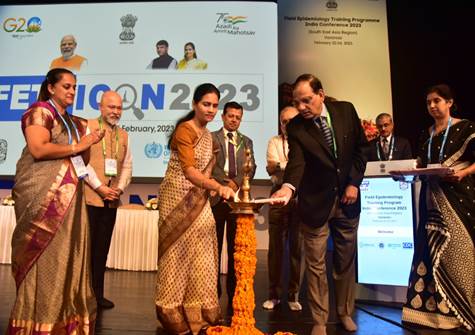Delhi : Dr. Bharti Pravin Pawar, Minister of State for Health and Family Welfare, addressed the Ministerial Roundtable at the 76th session of the World Health Organization Regional Committee for South-East Asia. During the conference, Dr. Pawar emphasized the significance of investing in primary healthcare as a key element in achieving Universal Health Coverage.
The conference witnessed the signing of the “Delhi Declaration,” highlighting the commitment to strengthen primary healthcare as a fundamental step towards achieving universal health coverage.
Dr. Pawar underscored the importance of this investment, stating that it is the most inclusive, equitable, and cost-effective approach to realizing Universal Health Coverage. She elaborated on India’s healthcare system, which follows a holistic “whole of government” and “whole of society” approach, ultimately leading to the enhancement of primary healthcare and essential health services to pre-pandemic levels.
Dr. Pawar highlighted the transformative impact of India’s Ayushman Bharat Health and Wellness Centres (AB-HWCs, numbering more than 1.61 lakh). These centers provide comprehensive primary healthcare services to people of all age groups, free of charge, and employ a continuum of care approach. This approach has resulted in improved population coverage, reduced out-of-pocket expenditure, risk factor mitigation, and the decongestion of higher-level healthcare facilities, ultimately enhancing the quality of care at all levels.
The introduction of the Community Health Officer (CHO) cadre at primary levels and the revision of Indian Public Health Standards in 2022 have been crucial policy reforms to ensure the availability of quality health services across all care levels. Dr. Pawar mentioned the undertaking of quality accreditation for primary healthcare facilities through India’s National Quality Assurance Standards (NQAS) initiative.
Dr. Pawar commended the growth of health initiatives in India, facilitated by a skilled workforce, adequate training, the availability of essential medicines and supplies, and an integrated supply chain. Digital health ecosystems, community mobilization, and health promotion have played key roles in service delivery interventions.
She reiterated the government’s focus on wellness, evidenced by activities like Yoga, Cyclothon, Walk-a-thons, Fit India, and Eat Right campaigns. The implementation of telemedicine platforms has significantly increased access to medical advice through e-Sanjeevani.
Looking to the future, Dr. Pawar revealed that AB-HWCs are expanding their scope to address gaps in specific areas of care, such as mental health, elderly care, and palliative care. The Ayushman Bharat Digital Mission (ABDM) aims to create a comprehensive digital health ecosystem, with investments directed toward standards-based digital health transformation.
Dr. Poonam Khetrapal Singh, Director of WHO SEARO, praised the comprehensive healthcare services provided at primary levels in India through AB-HWCs, emphasizing the provision of preventive services. She commended the introduction of the Community Health Officer cadre and the transition from “illness to wellness,” highlighting the importance of this approach.
The event was attended by senior government officials, World Health Organization representatives, and Professor Anne Mills from the London School of Hygiene and Tropical Medicine.


